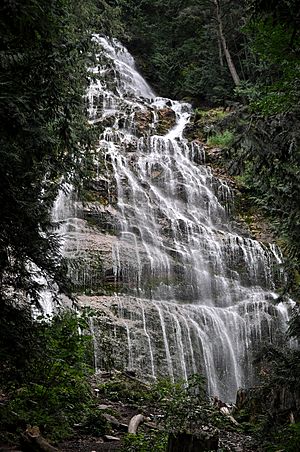Bridal Veil Falls Provincial Park facts for kids
Quick facts for kids Bridal Veil Falls |
|
|---|---|
 |
|
| Lua error in Module:Infobox_mapframe at line 185: attempt to index field 'wikibase' (a nil value). | |
| Location | Chilliwack, British Columbia, Canada |
| Type | Segmented tiered |
| Total height | 122 metres (400.26 ft) |
| Number of drops | 1 |
| Average width | 23 metres (75.46 ft) |
| Watercourse | Bridal Creek |
Bridal Veil Falls Provincial Park is a beautiful park in British Columbia, Canada. It's located near Chilliwack, right off the Trans-Canada Highway. The park is famous for its stunning waterfall, Bridal Veil Falls.
Getting to the falls is easy! You can take a short, pleasant walk from the parking lot. The trail is well-kept and usually takes about 15 to 25 minutes.
Contents
What Makes Bridal Veil Falls Special?
A Waterfall Like a Veil
The park gets its name from the amazing waterfall it protects. Bridal Veil Falls drops 122 metres (400 feet) down a wide rock face. This creates a beautiful "veil-like" effect, which is how it got its name.
While the falls are very tall, you can best see the bottom 60 to 75 metres (200–250 feet) from the viewing area. The waterfall is the 38th highest in British Columbia. Sometimes people mistakenly say it's the 4th tallest in Canada.
Where the Water Comes From
The water for Bridal Veil Falls starts high up on Mount Archibald. It then flows into a stream called Bridal Creek. From there, the water travels to the Cheam Lake Wetlands Regional Park. Finally, it reaches the mighty Fraser River.
Visiting the Falls: What to Expect
Seasonal Changes
The waterfall looks different depending on the time of year. During dry summer months, the amount of water flowing over the falls decreases. This makes the "veil" effect less dramatic.
Winter Closures and Ice
In cold winters, Bridal Veil Falls can freeze solid. This creates a huge wall of ice. Because the ice can be unstable and dangerous, the park usually closes during the winter season.
When the falls freeze completely, they become a challenging spot for ice climbers. However, it's known to be a difficult climb. Also, the conditions for safe climbing don't happen very often.
A Bit of History
How the Falls Got Their Name
The name "Bridal Veil Falls" was given in the 1800s by the nearby village of Popkum. It's a name that perfectly describes the waterfall's unique look.
Power from the Falls
In the early 1900s, the village of Popkum used the waterfall for power. They had a hydro-electric generator. This generator helped power a chalet and a heated swimming pool in the village. Today, you can still find the concrete foundation of this old generator.
 | Emma Amos |
 | Edward Mitchell Bannister |
 | Larry D. Alexander |
 | Ernie Barnes |

